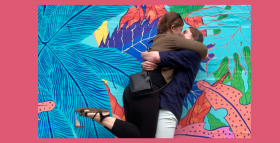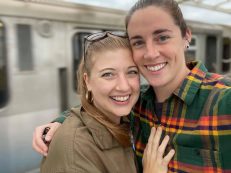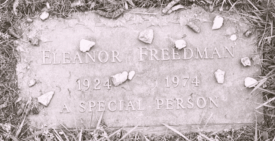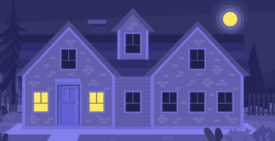After my mom died in 2013, I wondered if I would meet my “person” in a grief support space, where I suddenly found myself spending a lot of my time. Grief is generally gray and ambiguous, but I found it very black and white when it came to dating. When I went out for coffee with a potential mate, I rolled out my loss story early, testing the waters to see if they were in the Grief Club—or had at least some baseline familiarity with it. Prospective partners were swiftly corralled into two categories: those who knew grief and those who didn’t. Those who did continued to future levels of relationship intimacy. Those who didn’t—well—let’s just say things didn’t last long. To be sure: “griever” wasn’t the sole identity of my ideal partner, but it was an important one.
Despite the fact that I’d pondered meeting a partner in Grief World, I wasn’t optimistic. Facebook groups and in-person support circles aren’t designed for or intended to be pick-up scenes. More often than not, people are mourning love, not seeking something new. Conversations aren’t about building partnership; they’re about learning to do life alone.
Second, I’m a grief professional. So I didn’t want to participate in anything that felt presumptuous or predatory with regard to my work and clients. My first and highest priority is guiding people through loss, not landing a date.
That’s why I was so surprised to meet Heather in an online Modern Loss workshop in February 2021. I was leading the event—a conversation about navigating friendships after loss—and there she was, crocheting and listening intently in the upper right hand corner of my Zoom grid. My heart fluttered watching her hands move nimbly with the yarn, noticing her nod as I said something that resonated. She was beautiful and tranquil. And I wanted to know her.
Afterwards, I posted a picture on my Instagram about how well the workshop went and she left an appreciative comment. This is my chance!, I thought. And for the first time ever, I slid into someone’s DMs. I told her I was intrigued by her. I had no idea if she was single, if she was queer, or if she was anywhere geographically close to me, but I took a deep breath and pressed send anyway. Within two hours, she agreed to a date. I was over the moon.
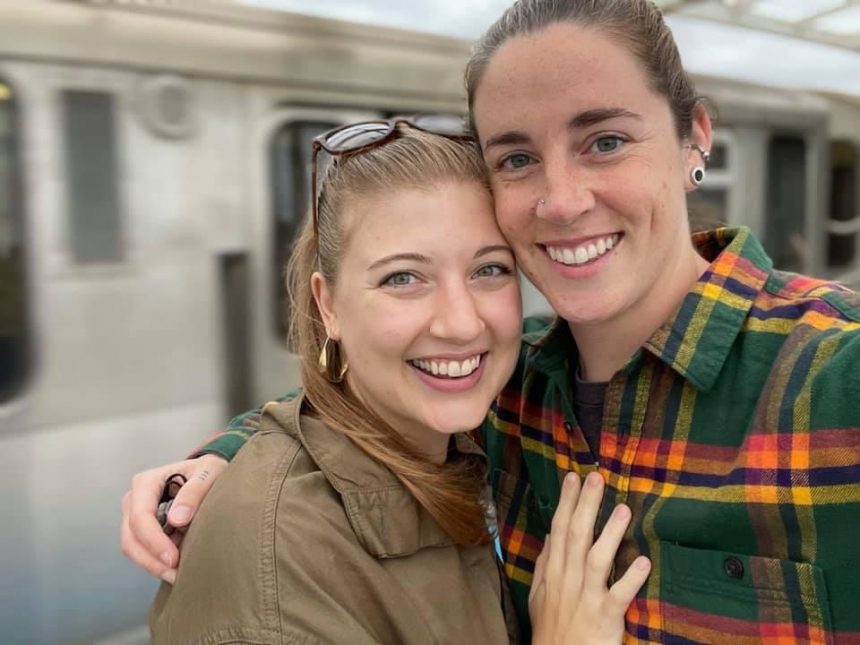
Shelby and her fiancé, Heather
Turns out yes, she was single; yes, she was queer; and yes, she was somewhere close enough to meet. After a handful of Zoom dates, we met in real life at Peace Arch State Park, a green grassy haven between the U.S. and her native Canada. Embracing her for the first time felt like an armful of home, and when we kissed, I knew I wanted to be beside her for the rest of my life.
Over the next several months, we pieced together puzzles and traded stories—silly ones and sad ones alike. We reveled in our mutual fondness for books, cats, and music. She messaged me videos of her reading poetry while I recovered from a frightening medical crisis, and I mailed her love notes galore, embellished with my signature teeny doodles. She shared photos of her parents and other family who’d died—losses that opened her up to the wide world of grief—and I brought forth memories and inside jokes from my mom to share with her—little bits of the first person I ever called home planting down roots in the second.
In January 2022, a little less than a year after I led that Modern Loss workshop, she proposed. And of course, I said yes.
Death brought us together. Death will be what separates us in the end. One day I’ll lose her. Or one day she’ll lose me. This is what we know for sure. It’s divine and devastating, all in the same breath.
Committing to love and live alongside another human being after experiencing loss is terrifying. Sometimes I catch Heather staring at me and smiling and I’m accosted by the fragility of it all. In a flash I think, Oh god you’re going to die!, Immediately followed by another flash: Oh god… so am I.
Committing to love and live alongside another human being after experiencing loss is terrifying. Sometimes I catch Heather staring at me and smiling and I’m accosted by the fragility of it all.
When my mother died, I suddenly and deeply comprehended the fact that we live in a world where anything can happen. There’s no pattern or order to death and there’s certainly no way to stop it. The most practical and cynical parts of my brain tell me it makes no sense at all to voluntarily enroll in that kind of suffering again.
And yet… when I’m with Heather, I love her from a place in my heart that includes the pain. I hold her in my arms with the full, felt wisdom that there is grief baked into our togetherness. I treasure our time together because I have no idea how much time we have left. I jump into our relationship with both feet, not because “love conquers all” or “love wins,” but because I know I don’t get a do-over.
I feel genuinely lucky to have met my partner in a grief workshop. In some ways, grief has taught us how to love. We approach each other with full presence and unguarded affection, because we know so intimately what will happen down the road. We say everything now, because we might not get to say it later. And we value our shared life—from the big milestones to the tiniest interactions, because every moment matters. Death has made our love precious. And I wouldn’t have it any other way.
Shelby Forsythia is an intuitive grief guide and the author of Your Grief, Your Way and Permission to Grieve.

